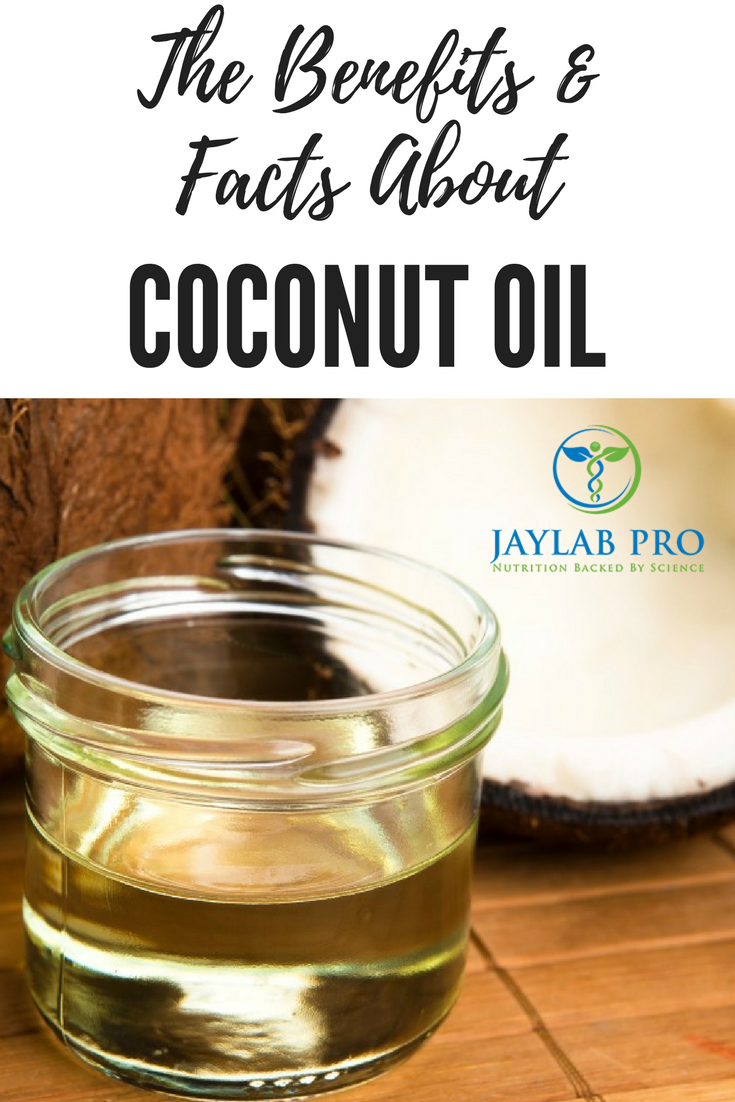- Home
- Our story
- Nutrition Quickies
- Products
- Ingredients
- Articles
- Success Stories
- Contact Us
- Timeless Radiance
- JayLab Pro Prosta-7
- BloodFlow Guardian
- VG-6
- Ultimate Sleep Solution
- Fermented Turmeric
- Collagen Complex
- Ultra-Cleanse Detox
- Krill oil
- Probiotics
- Advanced Joint Support
- Gluco Guardian
- Multi-vitamin (Active Core Complex)
- Renewal for men (T20)
- Protein powder
- Combo-packs
- Login
[INFO SHEET] The 10 Reasons Why You Need More Coconut Oil In Your Life
.jpg) There are a lot of oils out there that are great for your health.
There are a lot of oils out there that are great for your health.
For example, omega-3 fatty acids (like what’s found in olive oil, nuts, and krill oil), have been shown to improve a whole host of cells and organs in your body including your brain, eyes, and heart.
Now, take coconuts and coconut oil. Many people have deemed this product bad due to the high levels of saturated fat that make up its fat content.
But, would you believe, coconut oil may be one of the BEST oils out there for improving health – and shedding a pound or two.
The TRUTH About Coconut Oil
As previously mentioned, the majority of the fat found in coconut oil is saturated fat – almost 90 percent of it.
And, from what you have heard, saturated fat is a no-no when it comes to better heart health.
But, wouldn’t you know it, the saturated fat in coconut oil is actually GOOD FOR YOU!
Take a minute to catch your breath…
The fat in coconut oil is mainly lauric acid, which is a medium-chain triglyceride.
This is important for two reasons.
Reason #1: Lauric acid is NOT stored by your body
Since lauric acid is a medium-chain triglyceride, it is rarely stored by your body.
In fact, this fat is mainly broken down in the liver, meaning it is used for energy and not packed into your hips, butt, or thighs.
Adding in a tablespoon or two of coconut oil – along with a healthy diet – may actually lead to better overall weight loss.
Reason #2: Coconut oil is IMPORTANT for heart health
 As you know, controlling your cholesterol and monitoring your triglyceride levels are necessary for improving your overall heart health.
As you know, controlling your cholesterol and monitoring your triglyceride levels are necessary for improving your overall heart health.
And guess what? Coconut oil has been linked to lower heart disease rates and improvements in cholesterol (could speed up the enzymes that break down fats in your body).
This is one reason why coconut oil is great for better heart health.
But, the benefits do not stop there!
In fact, depending on the type of oil you get (virgin or refined), you may find it contains a whole host of antioxidants and polyphenols.
These powerful nutrients are great for lowering inflammation and fighting off the damage caused by free radicals.
3. Contains Boatloads of Healthy Fat
There is a lot of fat in coconut oil. And most of that fat comes in the form of saturated fatty acids.
But…before you think it’s bad, think again. Most dietary fats are considered to be long-chain triglycerides. But the fat in coconut oil is medium-chain triglycerides, which are shorter fatty acids your body can use more efficiently.
In fact, these helpful fats often travel to your liver, where they are processed into ketones very quickly—which might provide positive benefits to your heart and brain health.
4. Could Boost Fat Loss
Society today is faced with many uncertainties when it comes to your health. We are faced with rising healthcare costs, illnesses, and higher risk for chronic diseases.
One of the main driving forces behind these health issues happens to be the rise in overweight and obese children and adults.
In order to control these health issues, it’s important to understand the nutrient profile you’re eating could determine the impacts on your health. Poor food choices could lead to poor health, while better choice could improve your health.
And that includes the type of fats you’re consuming. The fats found in coconut oil have been shown to strip away fat by increasing the amount of calories you burn each day. Studies have shown that including coconut oil—and medium chain triglycerides—could boost your metabolism by as much as 5 percent.
Done each day, this could increase the amount of calories your body uses each day, which could boost your overall weight loss.
5. Microbial Activity
If you’re concerned about bacteria and viruses that could make you sick, you will be happy that you’re including coconut oil.
Besides the heart and weight loss benefits, coconut oil contains a high amount lf lauric acid. And one component of this acid—monolaurin—has been shown to fight off dangerous pathogens, bacteria, and fungus that could make you sick.
There is also some evidence that the microbial activity may also improve your dental health. A process—called oil pulling—may fight off pathogens that could impact the health of your teeth.
6. Reduces Hunger
I am sure you’ve heard that healthy fats could reduce your appetite. And coconut oil is no different.
Studies suggest the fats found in coconut oil may lead to better appetite control, fewer calories consumed, and could even stimulate weight loss.
Why?
When your body processes coconut oil, it creates ketones, which have been shown to improve brain health and a variety of other benefits.
But these ketones may also boost your satiety hormones, therefore satisfying your appetite.
7. Boost HDL Cholesterol
Even though we have highlighted that coconut oil may boost heart health, it’s important to note that it could also boost your HDL cholesterol.
HDL cholesterol, which acts like a street sweeper, brings LDL cholesterol back to your liver to be processed.
When HDL levels are low, you could be more at risk for a heart attack or stroke. Even though saturated fats have been shown to increase bad cholesterol, the kind found on coconut oil may actually boost HDL cholesterol—which could add protection to your heart.
Plus, the fat in coconut oil may also alter the state of LDL particles, which could lower the levels that could cause issues with your heart.
8. Adds Benefits To Skin and Hair
Although we often recommend coconut oil when cooking—or as an addition to a shake, for example—there are other benefits of coconut oil that have nothing to do with eating it.
Coconut oil may be a natural moisturizer, which could add life to dull skin, and could protect your hair from harmful UV light from the sun.
9. Boost Brain Function
Although there is no cure for dementia or Alzheimer’s disease, adding coconut oil to your nutrition routine could protect brain health, and boost brain function.
Since the saturated fats are broken down into ketones, this could provide an alternate source of fuel for your brain cells.
Although more research is needed, this could be a powerful benefit as you get older.
10. May Reduce Visceral Fat
There are two types of fat in your body—subcutaneous and visceral fat. One, which is relatively harmless, and provides energy for your body to function, is subcutaneous fat. The other--visceral fat--is considered a deadly type of fat.
Visceral fat, which is metabolically active, produces inflammatory particles that could increase your risk for heart disease, brain issues, and strokes.
The fats found in coconut oil, however, may actually lower your visceral fat levels, which could add to the potential health benefits.
One study showed just two tablespoons a day, was able to reduce both BMI (body mass index) and waist circumference.
This means that body fat, and possibly visceral fat levels, reduced—just by adding coconut oil.
What Kind Should You Look For?
The BEST kind of coconut oil out there would be extra virgin. This type of oil contains more potent antioxidants and has a much stronger flavor.
Or, you could try refined coconut oil! This type of oil is milder in flavor, but still provides some of the antioxidants and plenty of lauric acid that makes this oil appealing.

But, be warned. Not all coconut oil is made the same. Some companies may use harmful chemicals to make their oil, so be sure to do your background work.
The Hottest Oil on the Market
Although there are a lot of oils that you can cook with (olive oil, avocado oil, sesame oil, etc.) there is one oil that is slowly making its way to the top of the list.
Coconut oil – which is 90 percent saturated fat – has been shown to improve heart health, lower cholesterol, and reduce inflammation levels in your body.
The main fat – lauric acid – is easily metabolized by your liver, so it is not stored by your body.
If you're looking for a new alternative oil – one that contains healthy fats – to cook with, then you should give coconut oil a try in some of your favorite recipes.
LIKE THIS CONTENT?
Join over 60 thousand other F.A.S.T. free-thinkers taking control of their health!
Get started and grab Your FREE 5 Blood Tests That Predict Heart Disease Better Than Cholesterol Guide!
Plus, we will send you cutting edge health news, therapies and daily strategies to maintain an optimal health status!

Be sure to share this article with your family and friends and reinforce the need to use coconut oil everyday!
The #1 WORST Oil For Cooking Is?

New Study Proves THIS Can Help You Burn Fat Faster - Without Spending Any More Time In The Gym

What They NEVER Want You To Find Out About Butter
Be sure to SHARE this article on your favroite social media outlets such as Facebook, Twitter, Pinterest, and Google +.
References:
Vijayakumar M, Vasudevan DM, Sundaram KR, Krishnan S, Vaidyanathan K, Nandakumar S, Chandrasekhar R, Mathew N. A randomized study of coconut oil versus sunflower oil on cardiovascular risk factors risk factors in patients with stable coronary heart disease. Indian Heart J. 2016 Jul-Aug;68(4):498-506.
Cardosa DA, Moreira AS, de Oliveira Gm, Raggio-Luiz R, Rosa G. A Coconut Extra Virgin Oil-Rich Diet Increases HDL Cholesterol and Decreases Waist Circumference and Body Mass Index in Coronary Artery Disease Patients. Nutr Hosp. 2015 Nov 1;32(5):2144-52.
St-Onge MP, Jones PJ. Greater rise in fat oxidation with medium-chain triglyceride consumption relative to long-chain triglyceride is associated with lower initial body weight and greater loss of subcutaneous adipose tissue. Int J Obese Relat Metab Disord. 2003 Dec;27(12):1565-71.
St-Onge MP, Bourque C, Jones PJ, Ross R, Parsons WE. Medium-versus long-chain triglycerides for 27 days increases fat oxidation and energy expenditure without results in changes in body composition in overweight women. Int J Obes Relat Metab Disord. 2003 Jan;27(1):95-102.



